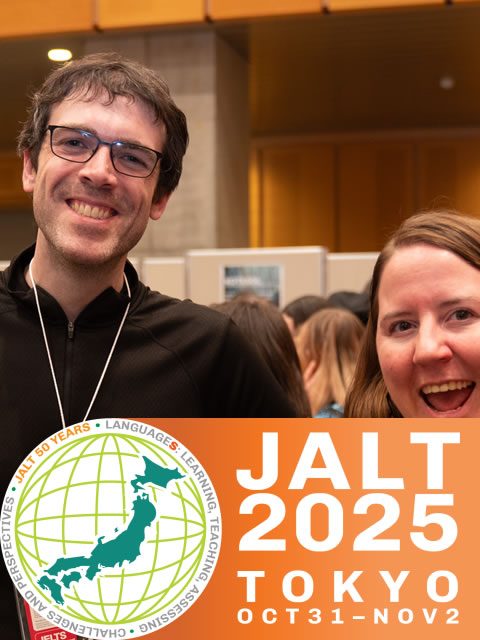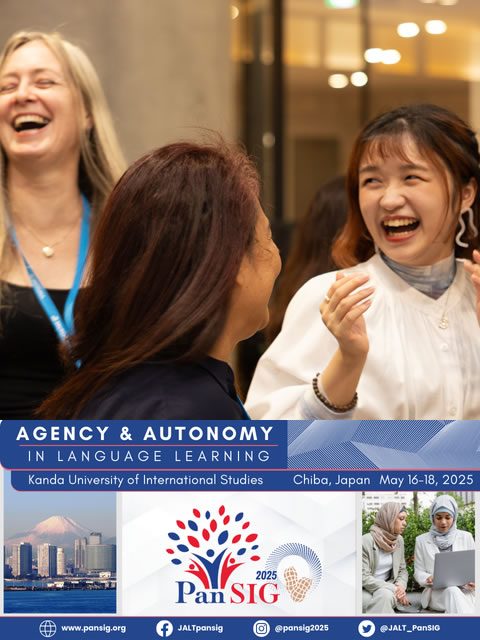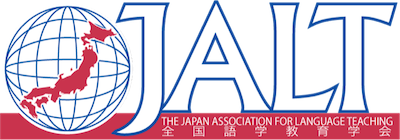Your cart is currently empty!
Event Report, Nara Chapter September 2019
•
With the 2019 JALT International Conference approaching, Nara Chapter continued its exploration of the conference theme, Teacher Efficacy, Learner Agency, at a local level from the perspective of both established and early-career educators.
In the first presentation, Robert Maran, Professor Emeritus at Osaka Shoin Women’s University, discussed an EFL program he had coordinated, focusing on his observation and interpretation of “learner agency” in program planning and “collective teacher efficacy” among the team of teachers. He first talked about the general outline of the coordinated EFL program and the subjects and students, and then briefly mentioned what “learner agency” and “teacher efficacy” are. In terms of the concept of teacher efficacy, Maran focused on “evidence of impact”, or the actual confirmation of how teachers have influenced students’ learning outcomes. Well, how can “evidence of impact” be measured? Can only test results show it? Is the creation of learning portfolios a better indication? Does students’ participation in communicative activities only during class hours verify it? Let’s face it, given the general characteristics of the students his team taught – non-English majors with no clear need for learning English – he concluded that if the students at least adopted a positive attitude towards learning English, it could be interpreted as “evidence of impact.” Maran also introduced a function of collective teacher efficacy: experiences = four sources of collective teacher efficacy (mastery experiences, vicarious experiences, social persuasion, and affective statuses); and environment = six enabling conditions of collective teacher efficacy (advanced teacher influence, good consensus, cohesive staff, knowledge of one another’s work, responsiveness of leadership, and effective systems of intervention). He then analyzed the coordinated EFL program based on all the ten components. The employment situations of team teachers – whether they teach full-time or part-time – would affect the process of promoting collective teacher efficacy in EFL programs, since team teachers need to pursue shared educational goals and work together as one interdependent unit. Under prominent team leaders, well-coordinated EFL programs would have considerable potential for developing learner agency. Teacher efficacy and learner agency intertwine closely and cannot be separated.
In the second presentation, Sayaka Ishimizu, Associate Professor at the National Institute of Technology (Kosen), Nara College, talked about a teaching approach using a study tracker based on the Bullet Journal Method (BuJo). BuJo is a journaling method of tasks, events, and notes on a daily basis, which is an analog system for the digital age. After knowing how little time her students had spent on self-study outside class hours and how poorly they had organized their everyday class requirements and tasks, Ishimizu introduced in April, 2019 the study tracker system that encourages approximately 200 students in a one-year English course to keep a log of their everyday self-study hours on monthly study track sheets. The monthly study track sheet has four self-study areas that the students need to be engaged in and keep time records of: vocabulary build-up, assignments, class-content review, and class-content preparation. There is also space for “tasks” on the sheet where the students need to fill in the title of tasks when assigned specific tasks to carry out. Their daily records were added up and converted into weekly records. A preliminary survey highlighted that there was an increase in self-study hours compared with a year earlier among 150 out of 200 of the students who had reported their self-study hours at the end of this spring semester. By keeping records and revisiting their study trackers, the students were also able to observe their time allocation for each self-study area and amend it to improve their grades. It could be controversial whether those records self-reported by students are accurate and trustworthy, however, her focus appeared on the process of students’ self-engagement in keeping study records and forming a good study habit, rather than on an increase in their study hours. Ishimizu is herself a practitioner of BuJo and a witness to its effectiveness in empowering her time and energy. It would be interesting to know the complete results and observation of her study tracker project and how “evidence of impact” can be interpreted in her study.
I was honored to invite as presenters to this September event two active members of Nara Chapter: Robert Maran, my respected mentor, and Sayaka Ishimizu, a former colleague and close friend. Both presentations were well received and obtained positive feedback. It was a good opportunity to explore the conference theme, Teacher Efficacy, Learner Agency, just before the 4CT event in October and the JALT international conference in November. I hope this September event served as a booster for JALT 2019 from our local chapter.

JALT2025 International Conference
2025年10月31日(金)〜2025年11月02日(日) 東京都渋谷 国立オリンピック記念青少年総合センター Friday, October 31 – Sunday, November 02, 2025 • National Olympics Youth Memorial Center, Tokyo, Japan

PanSIG Conference
PanSIG 2025 will be held May 16-18 in Chiba. PanSIG is an annual conference organized by JALT’s Special Interest Groups (SIGs).
